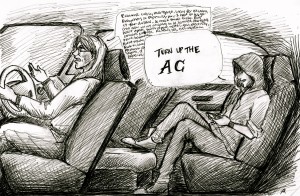These past few weeks have been a fiasco with shootings at Aurora, Colo. and a Sikh temple in Oak Creek, Wis. And just recently, on Aug. 6, an explosion at the Chevron refinery in Richmond, California forced employees to evacuate.

The question is, what’s going to happen now? Namely, what will happen to gas prices?
After the explosion, the average price of gas in California rose to $4.10 a gallon. According to AAA, the price of gas is 37 cents more than it was this time last year.
“The recent fire at the Chevron refinery in Richmond has created a short term spike in gas prices across many parts of the Pacific Northwest and Nevada,” said American Automobile Association representative Cynthia Harris in a statement.
Although this “short term spike” tickles the subconscious of the students who drive, there is very little indication of them responding strongly to this predicament. In other words, 37 cents doesn’t mean much to most teenagers (that’s not even enough for a pack of chips at 7/11), or at least the ones who forget that their parents pay for their insurance.
For those who aren’t really familiar with the history of gas prices, a gallon was only around $1.199 in 1996, according to the U.S. Energy Information Administration. Prices over four dollars per gallon and a spike of 37 cents are unnervingly expensive.
“It still remains to be seen how long the impact of the fire will be felt,” Harris said in the statement.
This “impact” is for the consumers, in other words, our parents, who care more about the car than just the make and model. A recent study done by the Oil Price Information service for CNN Money revealed that, in 2011, the average American household spent $368.09 on gas per month. That is nearly nine percent of the average American income. This is a significant increase from an average of 5.7 percent since 2000.
Cupertino is not a cheap town to live in, either. With many houses having $1 million price tags, parents have a lot on their plates. The fact is that money is hard to come by, especially these days. Today, many families are cutting back on spending by clipping coupons, buying in bulk and cutting down on electricity and water bills. So don’t be surprised if you are told to take a hike — on a sidewalk — to school. It’s good for your budget and maybe even good for you.
The economy is still in repair, even if having a BMW is a norm in your neck of the woods. Therefore, be more conscious of the issues, because they concern you. You might not notice the price of gas now, but you will when the tank runs empty.







